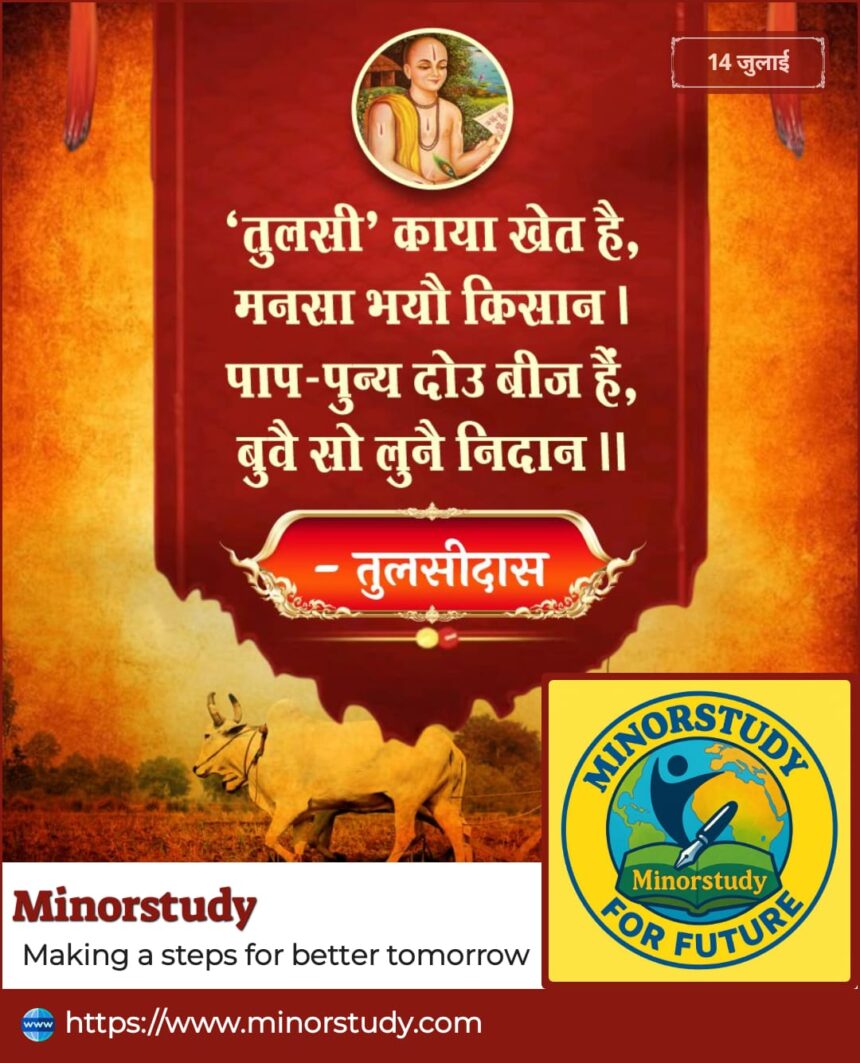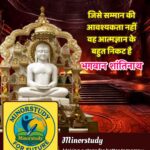🕉️ 7 Life-Changing Lessons from Tulsidas That Reveal the Power of Mind and Karma
“Tulsi tan khet hai, man karni kisan | Pāpa-punya du bīj hai, bove so le jān॥”
— Goswami Tulsidas Ji
This doha (couplet) by Goswami Tulsidas, the saint-poet and author of the immortal Ramcharitmanas, illustrates one of the most profound truths of human existence. He compares the body to a field, the mind to a farmer, and our actions (karma)—whether good or bad—as seeds that we plant and harvest ourselves.
Let’s explore the history, teachings, spiritual relevance, and daily life impact of Tulsidas Ji’s life and words that continue to shape millions across the globe.
📜 Who Was Tulsidas? – A Brief History
| Element | Details |
|---|---|
| Full Name | Goswami Tulsidas |
| Born | 1532 CE (Samvat 1589) in Rajapur, Uttar Pradesh |
| Spiritual Era | Bhakti Movement |
| Notable Works | Ramcharitmanas, Hanuman Chalisa, Vinay Patrika, Dohavali |
| Language | Awadhi, Sanskrit |
| Philosophy | Rama Bhakti (Devotion to Lord Rama) |
| Death | 1623 CE (Samvat 1680), Varanasi |
Tulsidas was more than a poet—he was a spiritual reformer, philosopher, and messenger of divine love and truth.
🗓️ Timeline of Goswami Tulsidas Ji
| Year (Samvat) | Event |
|---|---|
| 1589 (1532 CE) | Birth in Rajapur, Chitrakoot |
| 1600s | Wandering life of devotion, writing of Ramcharitmanas begins |
| 1631 | Completion of Ramcharitmanas at Tulsi Ghat, Varanasi |
| 1640–1680 | Composes Hanuman Chalisa, Vinay Patrika, Kavitavali |
| 1680 (1623 CE) | Leaves mortal body in Varanasi |
📚 Core Philosophy Behind the Doha
This doha touches on Karma, Self-awareness, and the Mind-Body Connection:
Body as a field (tan khet): Life is like a plot of land where everything manifests.
Mind as a farmer (man karni kisan): Our thoughts and decisions are the real doers.
Sin and virtue as seeds: The karma (good or bad) that we sow is our own doing.
Outcome is self-resolved: We face the consequences of what we plant—no escape.
🌱 7 Powerful Lessons from Tulsidas’ Wisdom
1. The Mind is the Real Creator of Your Destiny
Tulsidas stresses that while our body is an instrument, it’s the mind that decides what actions we take. Your thoughts are your seeds, and they shape your karma.
✅ Modern Insight: Mindfulness, meditation, and self-awareness are modern practices echoing this truth.
2. You Reap What You Sow
The doha reminds us of the eternal law of karma. Sin and virtue are not random; they are the outcome of our own choices.
✅ Spiritual Takeaway: You are not a victim. You are the architect of your destiny.
3. Every Human is Born with the Power of Free Will
Unlike inert soil, human life has consciousness. We decide which “seeds” to plant—greed or compassion, ego or humility.
✅ Real-Life Impact: Every moment is an opportunity to choose virtue over vice.
4. External Blame is a Distraction from Inner Growth
Tulsidas teaches personal accountability. No enemy is outside us—the true enemy lies in ignorance and uncontrolled desire.
✅ Practical Advice: Stop blaming society, fate, or others. Look within.
5. Mind Cultivation is Greater than Rituals
While Tulsidas respected Vedic rituals, he gave superior value to inner purity and surrender to Rama.
✅ Spiritual Message: Without a pure mind, even the most elaborate rituals are hollow.
6. Devotion and Karma Go Hand in Hand
Tulsidas balanced both bhakti (devotion) and karma (righteous action). He was devoted to Lord Rama yet never escaped his worldly duties.
✅ Daily Life Tip: Spirituality is not escapism; it’s about performing every duty with love and detachment.
7. Humility and Surrender are Supreme
Despite being a literary genius, Tulsidas remained humble, simple, and always attributed his work to Lord Rama.
✅ Moral Lesson: Ego is the biggest weed in the field of life. Surrender it to grow spiritually.
🙌 Significance in Today’s Life
In the age of social media, stress, and competition, Tulsidas’ teachings offer a simple yet profound framework:
Your mind is the beginning of everything.
Your karma is your responsibility.
Your devotion gives your life purpose.
His philosophy reminds us: the battle is within us—not outside.
📿 Observance and Reverence of Tulsidas Ji
| Date | Festival/Event |
|---|---|
| Shravan Shukla Saptami | Tulsidas Jayanti (Celebrated in Uttar Pradesh and North India) |
| Hanuman Jayanti | Devotees recite Hanuman Chalisa in his memory |
| Ram Navami | Recitation of Ramcharitmanas |
| Tulsi Ghat, Varanasi | Pilgrimage site associated with his writing |
💬 Famous Works of Tulsidas
Ramcharitmanas – Story of Lord Rama in Awadhi
Hanuman Chalisa – 40-verse devotional hymn to Hanuman
Vinay Patrika – Petition to Lord Rama in 279 hymns
Dohavali – 573 couplets on morality and devotion
Kavitavali – Poems glorifying Rama’s divine attributes
💡 Important Points to Remember
Tulsidas made spirituality accessible to the common man.
He was a catalyst of the Bhakti Movement, breaking barriers of caste and class.
His dohas blend philosophy with poetic charm, making them timeless.
His Hanuman Chalisa is recited across the globe—even by non-Hindus.
Tulsidas was not just a poet but a divinely inspired reformer and guide.
🙏 Wishing in the Spirit of Tulsidas
🌸 May the seeds of your actions be righteous and filled with compassion.
🌿 May your mind remain pure, calm, and focused like a true farmer of dharma.
🪔 May the grace of Lord Rama and the wisdom of Tulsidas guide your every step.
❓ Frequently Asked Questions (FAQs)
Q1: Who was Tulsidas Ji?
Tulsidas was a 16th-century poet-saint, considered an incarnation of Valmiki, the composer of Ramcharitmanas and Hanuman Chalisa.
Q2: What does his doha on karma mean?
It illustrates that our body is the field, mind the farmer, and our actions are the seeds. We bear the fruit of what we sow—good or bad.
Q3: Why is Ramcharitmanas so famous?
It presents Lord Rama’s life in a poetic and accessible language (Awadhi), bringing spiritual philosophy to the masses.
Q4: Is Tulsidas relevant today?
Absolutely. His teachings on self-awareness, karma, and humility resonate strongly with modern life and mental wellness.
Q5: What is the message of the Hanuman Chalisa?
It emphasizes strength, devotion, wisdom, and the removal of obstacles through faith and surrender.
🧘♂️ Conclusion: Harvest Your Life with Awareness, Like Tulsi Taught
The simplicity of Tulsidas Ji’s words belies their spiritual depth. His doha is a reminder and a mirror:
You are both the farmer and the field.
You choose the seeds.
You reap the fruits.
“Your karma is your destiny. Your mind is the cause. And your soul is waiting to blossom.”
Let us nurture our life with love, surrender, and awareness, remembering that the harvest we seek begins within.








